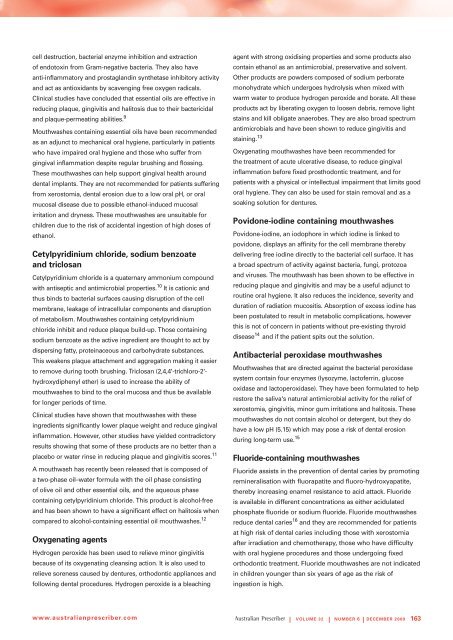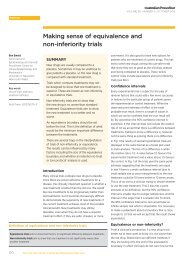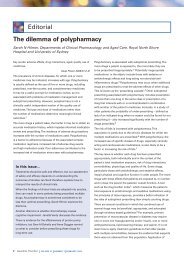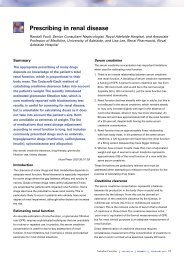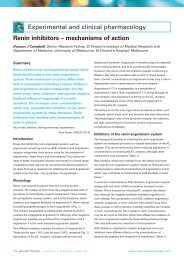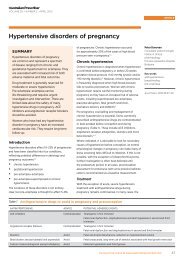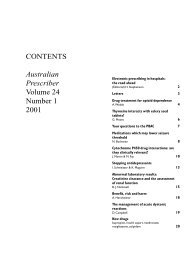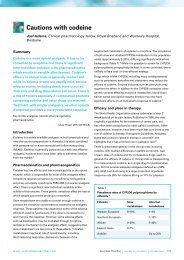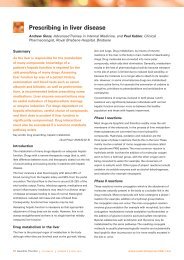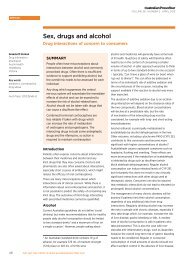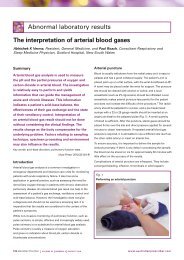Mouthwashes - Australian Prescriber
Mouthwashes - Australian Prescriber
Mouthwashes - Australian Prescriber
Create successful ePaper yourself
Turn your PDF publications into a flip-book with our unique Google optimized e-Paper software.
cell destruction, bacterial enzyme inhibition and extractionof endotoxin from Gram-negative bacteria. They also haveanti-inflammatory and prostaglandin synthetase inhibitory activityand act as antioxidants by scavenging free oxygen radicals.Clinical studies have concluded that essential oils are effective inreducing plaque, gingivitis and halitosis due to their bactericidaland plaque-permeating abilities. 9<strong>Mouthwashes</strong> containing essential oils have been recommendedas an adjunct to mechanical oral hygiene, particularly in patientswho have impaired oral hygiene and those who suffer fromgingival inflammation despite regular brushing and flossing.These mouthwashes can help support gingival health arounddental implants. They are not recommended for patients sufferingfrom xerostomia, dental erosion due to a low oral pH, or oralmucosal disease due to possible ethanol-induced mucosalirritation and dryness. These mouthwashes are unsuitable forchildren due to the risk of accidental ingestion of high doses ofethanol.Cetylpyridinium chloride, sodium benzoateand triclosanCetylpyridinium chloride is a quaternary ammonium compoundwith antiseptic and antimicrobial properties. 10 It is cationic andthus binds to bacterial surfaces causing disruption of the cellmembrane, leakage of intracellular components and disruptionof metabolism. <strong>Mouthwashes</strong> containing cetylpyridiniumchloride inhibit and reduce plaque build-up. Those containingsodium benzoate as the active ingredient are thought to act bydispersing fatty, proteinaceous and carbohydrate substances.This weakens plaque attachment and aggregation making it easierto remove during tooth brushing. Triclosan (2,4,4'-trichloro-2'-hydroxydiphenyl ether) is used to increase the ability ofmouthwashes to bind to the oral mucosa and thus be availablefor longer periods of time.Clinical studies have shown that mouthwashes with theseingredients significantly lower plaque weight and reduce gingivalinflammation. However, other studies have yielded contradictoryresults showing that some of these products are no better than aplacebo or water rinse in reducing plaque and gingivitis scores. 11A mouthwash has recently been released that is composed ofa two-phase oil–water formula with the oil phase consistingof olive oil and other essential oils, and the aqueous phasecontaining cetylpyridinium chloride. This product is alcohol-freeand has been shown to have a significant effect on halitosis whencompared to alcohol-containing essential oil mouthwashes. 12Oxygenating agentsHydrogen peroxide has been used to relieve minor gingivitisbecause of its oxygenating cleansing action. It is also used torelieve soreness caused by dentures, orthodontic appliances andfollowing dental procedures. Hydrogen peroxide is a bleachingagent with strong oxidising properties and some products alsocontain ethanol as an antimicrobial, preservative and solvent.Other products are powders composed of sodium perboratemonohydrate which undergoes hydrolysis when mixed withwarm water to produce hydrogen peroxide and borate. All theseproducts act by liberating oxygen to loosen debris, remove lightstains and kill obligate anaerobes. They are also broad spectrumantimicrobials and have been shown to reduce gingivitis andstaining. 13Oxygenating mouthwashes have been recommended forthe treatment of acute ulcerative disease, to reduce gingivalinflammation before fixed prosthodontic treatment, and forpatients with a physical or intellectual impairment that limits goodoral hygiene. They can also be used for stain removal and as asoaking solution for dentures.Povidone-iodine containing mouthwashesPovidone-iodine, an iodophore in which iodine is linked topovidone, displays an affinity for the cell membrane therebydelivering free iodine directly to the bacterial cell surface. It hasa broad spectrum of activity against bacteria, fungi, protozoaand viruses. The mouthwash has been shown to be effective inreducing plaque and gingivitis and may be a useful adjunct toroutine oral hygiene. It also reduces the incidence, severity andduration of radiation mucositis. Absorption of excess iodine hasbeen postulated to result in metabolic complications, howeverthis is not of concern in patients without pre-existing thyroiddisease 14 and if the patient spits out the solution.Antibacterial peroxidase mouthwashes<strong>Mouthwashes</strong> that are directed against the bacterial peroxidasesystem contain four enzymes (lysozyme, lactoferrin, glucoseoxidase and lactoperoxidase). They have been formulated to helprestore the saliva's natural antimicrobial activity for the relief ofxerostomia, gingivitis, minor gum irritations and halitosis. Thesemouthwashes do not contain alcohol or detergent, but they dohave a low pH (5.15) which may pose a risk of dental erosionduring long-term use. 15Fluoride-containing mouthwashesFluoride assists in the prevention of dental caries by promotingremineralisation with fluorapatite and fluoro-hydroxyapatite,thereby increasing enamel resistance to acid attack. Fluorideis available in different concentrations as either acidulatedphosphate fluoride or sodium fluoride. Fluoride mouthwashesreduce dental caries 16 and they are recommended for patientsat high risk of dental caries including those with xerostomiaafter irradiation and chemotherapy, those who have difficultywith oral hygiene procedures and those undergoing fixedorthodontic treatment. Fluoride mouthwashes are not indicatedin children younger than six years of age as the risk ofingestion is high.www.australianprescriber.com| Volume 32 | NUMBER 6 | DECEMBER 2009 163


